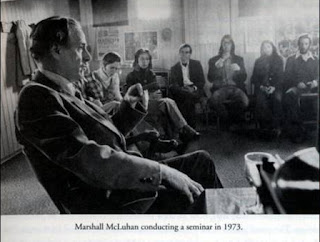For readers unfamiliar with the phenomenon of Marshall McLuhan, I suggest reading the following articles about him, to give some context to my memoire here:
http://www.cyberchimp.co.uk/research/testoftime.htm
http://www.wired.com/wired/archive/4.01/saint.marshal_pr.html
At the Monday evening seminars, McLuhan would hold forth with his probes (they weren't exactly "theories"), and those with enough self-confidence would ask questions or offer comments. He welcomed intelligent questions and comments, but he had no patience for cliche or sycophantic responses. A visiting priest once spoke up about how much he appreciated McLuhan and concluded with, "Every day I learn something new, and tonight has been. . ." Here McLuhan interrupted with, "Just another day," and then he quickly moved on to the next topic. Faint souls would do well to keep their mouths shut in those seminars so as not to have their feelings hurt. McLuhan was more interested in hearing new ideas than in suffering blather. For my major presentation in that seminar, I chose to read aloud from Tom Wolfe's essay about McLuhan, "What If He's Right?" from The Pump House Gang, and then lead a discussion on it. It was a good class, and McLuhan appreciated it. A few years later, when the graduate English department wanted to terminate my Ph.D. candidacy due to a three-hour essay exam in Modern Literature, despite two years of course work with A's in English courses and a pass on the other two parts of the Ph.D. general exams, the written in Victorian Literature and the dreaded oral exam in Victorian, McLuhan championed my protest and blamed my "failure" on my having had a weak faculty adviser. I even heard that he confided to a group of my classmates that I was too "intelligent" for that department, which, of course, I regard as the highest compliment I could have received. The reference letter that he wrote for me gives evidence of that, and I persevered in getting the original after his passing:
In addition to being a brilliant scholar, teacher, and creative artist, Marshall McLuhan was also a kind and generous person, who contributed greatly to my life experience, as well as to the lives of many others. I was able to use his ideas, not to mention his courage to pun, in my own high school teaching career. I should add that his wife, Corinne, even visited my former wife in hospital at the birth of my oldest son Matthew. I was also fortunate enough to be able to thank Marshall and Corinne after his stroke in the early 1980's, and show him how I was using his teachings in my own teaching. I am extremely grateful for his being a major mentor in my young adulthood.
One of my favourite McLuhanisms involves how we tend to be biased in favour of the sense of sight over the other senses: "seeing is believing" but "hearsay cannot be credible" The sense of sight, he would point out, was the only sense that gives the illusion of connectivity; the others work on intervals. We tend to be much more concerned with how we appear or look than with how we sound, etc. He reminded us that the sense of sight can fool us; we're like the fish in water who don't know they're in water until they're taken out of it. This brings me to the question of, "How can I prove that I was really present at the Monday night seminars?" Two photos have emerged of a Monday night seminar from 1973, one spotted by my son Matthew in a slideshow in a lecture on architecture and the other from a University of Toronto Alumni Magazine feature on McLuhan. You be the judge. First, how I look now, forty years later:
Next, the seminar photo from back then:
Next, a blowup of a person who might have been me:
Now, here's the other seminar photo:
And now here's the blowup from that photo:Many of my relatives and friends are sure that this image is me, but others disagree. I myself have come to believe that these blurs very well may be images of me forty years ago at a McLuhan seminar largely because of the attire and the slumped body language. Please tell me what you think in the comments, and, if by any chance, you, and not I, are the blur, please correct my misinterpretation!
I'm looking forward to your comments.







Hey, Richard,
ReplyDeleteGlad to see you posting this. The first blur I'm not so sure about, but I'd say that the second blur is ABSOLUTELY you, and, since the first and second blurs are the same person, then it's unanimous!
Thanks, Rolly! That settles it! I am the blur, unless someone steps forward claiming that title.
ReplyDeleteI'd have to agree with Rolly about the interpretation of the blurs. It is nice to read your recollection of your experience with McLuhan. I don't know if we even have academic gurus like him in our age. It was great that you had that renaissance in your education. The comments about him being intolerant of substandard questions sounds like a lot of my teachers at UMass Law. Keep the postings coming!!!
ReplyDeleteThank you, Stephen.
ReplyDelete